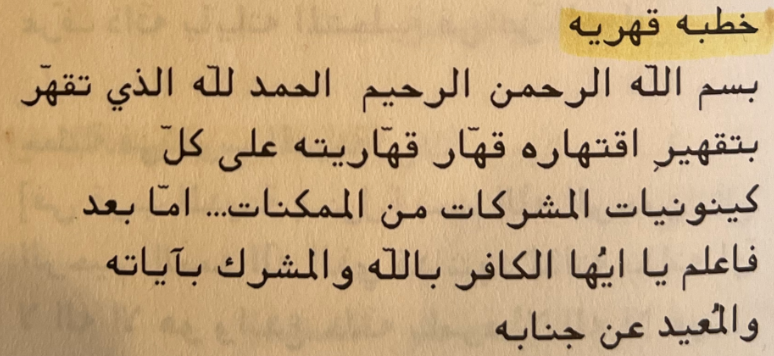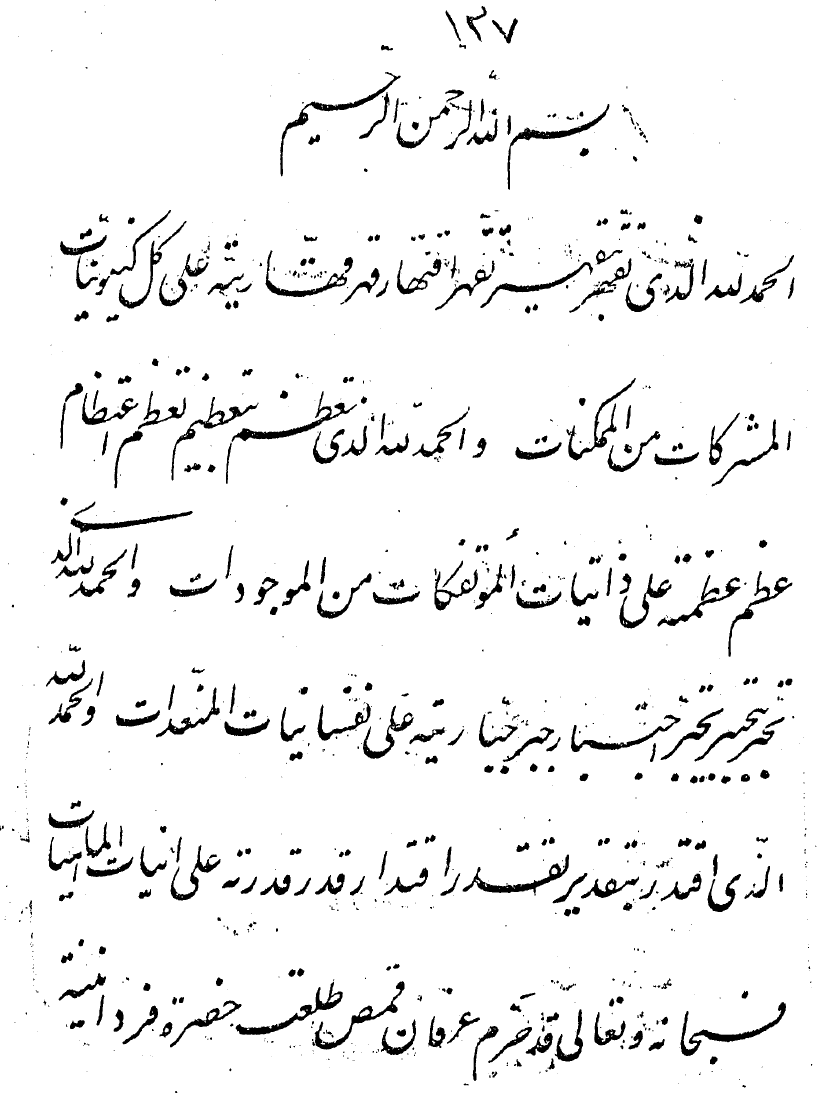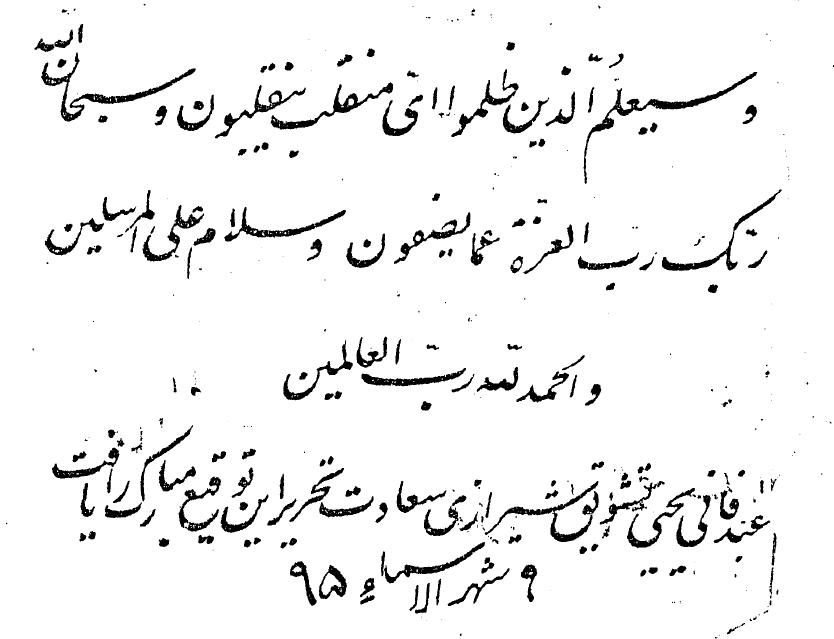![]()
Sayyid `Ali Muhammad Shirazi, the Bab (1819-1850)
The Khuṭba-yi qahriyya, the Literary Oration or "The Sermon of Wrath".
An Epistle directed to Hajji Mirza Aqasi and others.
♦
Introduction, Notes and Translation
Stephen Lambden 1980s + 2022.
Last updated 02-03-2022 - IN PROGRESS
INTRODUCTORY NOTE
The word قہريّه Qahriyya meaning, among other things, "wrathfulness" is derved from the triliteral Arabic root Q-H-R قہر . Arabic words derived from this root are quite common in the writings of the Bab and are not absent from those of Baha'u'llah. In the Qur'an the Arabic root Q-H-R as Qahhār is six times used of the Omnipotence of God, an important Divine Attribute (see Q. 12:39; 13:16; 14:48; 38:65; 39:4; 40:16). The active participle qāhir occurs three times in the Qur'an (Q. 6:18; 6:61 and 7:127) again according to the A J Arberry (d. 1969) translation, expressing God's being Omnipotent over His servants or triumphant over them (see Kassis, Concordance, p.902)..
It its simple verbal sense - qahara - can express `to subjugate, conquer, vanquish, defeat, overpower, overwhelm, etc. The verbal noun qahr may thus mean, among other things, : vanquishing, subjugation, compulsion, force, etc.
Arabic Manuscripts - see MacEoin, Sources, pp. 92-93; 186.
- Tehran, INBA 4012C, pp. 1-13
- INBMC 64:127-150.
- Princeton Ms,
The opening Lines of the (in its Persianized title) Khuṭba-yi Qahriyya ("The Sermon of Wrath" = Kh-Qahriyya), the Literary Oration of the Bab expressive of Wrathfulness, Forcefullness, Vengence, Vanquishment, Compelling Power an the shaping of Destiny.

Typescript based on ms[s]. as printed in MacEoin, Sources, App. Twelve, p.244 (cf. App. Eleven, pp. 229-230).
The opening lines according to INBMC 64:127

See further :
♦
The opening four Arabic verses or lengthy sentences of the Khuṭba-yi Qahriyya include a rhythmic celebration of the forceful, wrathful Divine Power, Might and Omnipotence. They are centered upon four successive Arabic roots with sometimes overlapping or synomymous senses [1] Q-H-R ( = Wrath, Force, Vanquishment), [2] `- Ẓ-M (= Might, Grandeur) [3] J-B-R (= Compulsion, Omnipotence) and [4] Q-D-R (= Destiny, Foreordainment, Power). The initial four succesive verses include parallel, five fold successions of derived verbal and/or nominal forms of the same or initial root. In the first instance of the root Q-H-R they are [1] tagahhar (verbal form II), [2] the verbal noun or adjective taf`īl = taqhīr ( not normally found = ), [3] verbal form VII, ifti`āl = iqtihāl (not normally found = ), [4] qahhār (Wrath-Generating, Triumphant or "Omnipotent" etc, is found 6 times in the Qur'an), [5] qahhāriyyat (Expressing Wrath, Triumph or Omnipotence...). These opening verses include neologisms, little or not normally found word formations from the four triliteral roots on which these first four lines are largely based.
In a brilliant, powerful and creative fashion the Bab expresses in the opening lines of the Kh-Qahriyya the fact that God through himself is very much in control of his servants and of the destinies of things. He can be victorious despite the seeming loss, humiliation and abasement of the Bab in his imprisonment in Mah-ku and Chihriq in NW Persia, in Adhirbayjan. The Bab can express wrath, punish humanity and shape or ordain human destiny. His power is incomparable. God, through the power of the Bab, is truly Omnipotent, One All-Compelling, Destiny shaping and All-Powerful. Such is the implication of the first fourfold opening lines of the powerful Kh-Qahriyya, the Litany of Wrath! Hajji Mirza Aqasi the then right-hand man of Muhammad Shah might exile the Bab into an Adhirbayjani oblivion but his message to him was that the power of God is in no wise diminished. The Bab responded to his cruel exile and lonely imprisonment with a powerful, forceful barrage of linguistic revelation unparalleled in the Qur'an itself.
Beta Lambden Translation of Opening and Closing Lines
[0]
In the Name of God, the Merciful, the Compassionate.
[I]
[1] Praised be to God who with thunderous Wrath expresses wrathful forcefulness (bi-taqhīr) by virtue of His indominatable wrathfulness (iqtihari-hi) which is Wrath-generating (qahhār) and expressive of His wrathful Power (qahhāriyyati-hi) towards all levels of Being (kaynuniyyāt) tending to blasphemous ways (al-mushrikāt) in their every possible mode of expression (min al-mumkināt)!
[2] And Praised be to God who greatly Magnifes by means of His Mighty Power (bi-ta`zīm)
[3] And Praised be to God
[4] And Praised be to God ...
[x]
[INBMC 64:133 line 7]
So be aware, O thou Disbeliever in God (kāfir bi'llāhi) and denier of His verses (mushrik bi-āyāt)!
Closing Lines
INBMC 64:150 - LAST LINES:

... They shall come to know, such as have comitted tryanny; that is to say, precipitated upheavel. And Glorified be God, thy Lord and Lord of Might above that which they do [vainly] describe! And peace be upon the sent Messengers (al-mursalin), And praised be unto God, the Lord of all the worlds.
♦
[Written by] the insignificant servant Yahyā Tashwiq Shirazi copyiest of this blessed letter [of the Bab] .... 9th of the [Babi-Baha'i] month of Asmā' (Names) [in the year] 95 [BE = 1939-40 CE].
Ā Ī Ū ā ī ū Ḍ ḍ ḥ Ḥ ṣ Ṣ ṭ Ṭ ẓ Ẓ
Ā Ī Ū ā ī ū Ḍ ḍ ḥ Ḥ ṣ Ṣ ṭ Ṭ ẓ Ẓ
In his The Sources for Early Babi Doctrine and History, A Survey (Leiden, New York, Koln : Brill, 1992, pp.92-93) Denis MacEoin includes some very useful observations about the Khuṭba-yi Qahriyya:
The Khuṭba-yi qahriyya
"Two further works must be menlioned briefly in connection with the Bāb's stay in the fortress of Chihrlq. The first is the Khuṭba-yi qahriyya (Sermon of Wrath), written for Hajl Mlrzā Āqāsī shortly after the Bāb's return from his judicial examination in Tabriz. The author of the Nuqṭat al-kāf includes it among a number of letters said to have been penned at this time to the Shāh and his chief minister.70 According to ZarandI (whose authority is Mlrzā Husayn `Ali Bahā' Allah), this letter was delivered to Āqāsl by Mullā Muhammad `Alī Zanjānī. 71 In view of the latter's close (if not always amicable) relations with court circles,72 this may welļ be true.
The dating of this work can be determined approximately, first by the statement that it was written after the retum from Tabriz, and secondly from a statement in the text that forty months had passed since the Bāb first wrote to Āqāsī.73
The text is taken up largely with an extended condemnation of Āqāsī and his treatment of the Bāb; but there are also references to the tyranny of the govemor of Fars, Husayn Khān Ajudān-bāshī, 74 the kindly reception afforded Shirāzī by Manuchihr Khān in Isfahan, 75 the Bāb's imprisonment in Māku, 76 and Aqāsī's harmful influence on Mubammad Shāh.77
A letter, separate from the Khuṭba-yi qahriyya, written from Chihrlq to Āqāsī, is quoted by Māzandarani. 78
Amanat maintains that the first Chihrlq letters of the Bāb to the Shah and Aqāsī formed the beginning of a series of Arabic letters known as the 'sermons of wrath' (khuṭab-i qahriyya).79 He refers to two later sermons
quoted by Mu`in al-Salṭana Tabrīzī and [Muhammad `Ali] Faydī, written after the Bab's trial in Tabrīz. " 80
Footnotes (on pp. 92-93)
"68 Jounal Asatique, 1887, viii scric, vol. x. 69. 'Thc Babls of Pcnia IT, pp. 885-86. 70. Nuqṭat al-kaf, p. 132.
71. Dawn-Breakers, p. 323. 72. See ibid, pp. 531-32; Nuqṭat al-kaf, pp. 125-26. 73. INBMC 64, p. 140. 74. lbid, p. 141. 75 lbid, p. 142. 76 lbid p. 144 .77. Ibid p. 147. 78. Zuhur al-Haqq, vol. 3, pp. 85-89. 79. Resurrection and Renewal, p.381. 80. lbid, p. 383 n.41. See·also Tabrizl, Tarikhh-i Mu'in al-Salṭana Tabrlzi, INBA, pp. 151-60; Faydī, Nuqṭa-yi Ula, pp. 304--06. [Fadil-i] Mazandaranī slates (Zuhur al-Haqq, vol. 3, p. 82) that he has includcd several `sermons of wrath' addrcsscd lo Āqāsī in the previous (unpublished) volume of his history."



